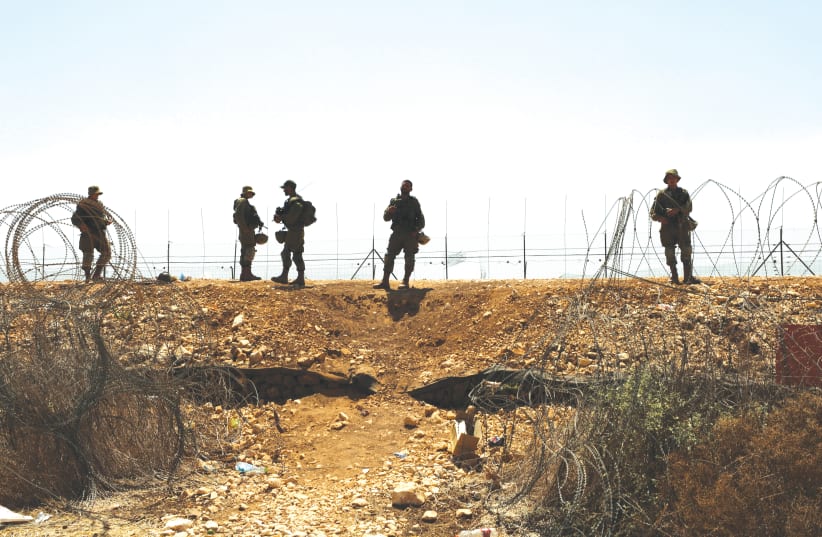The first time I visited Israel in 2013, at age 15, I didn’t particularly like it. The Jewish youth trip I was on had taken us first to Europe, where we toured Auschwitz, glimpsed the strangely familiar shtetl life that my ancestors left behind, and were imbued with a sense of awe at the fact that they had miraculously survived so much, for so long, all the while yearning for their Jewish homeland. Coming from that, I expected Israel to be this magical place where I, as a Jew, would instantly belong. I expected to feel at home there.
The Israel I first encountered didn’t look much like the Jewish homeland I had imagined. Everything was hot, bright, loud and strange. This was supposed to be the center of my Jewish culture, but I didn’t speak the language, I didn’t understand the customs and I couldn’t for the life of me figure out why every meal was served in a pita.
The scariest thing was that somewhere between the shop owners shouting their tour group discounts at me in the shuk, and the well-meaning Israelis correcting my pronunciation of the few Hebrew words I’d grown up with like mazel tov or menorah, I began to feel that I was a tourist in my own land. If this was my Jewish homeland, the object of my family’s 2,000 years of longing, why did I feel so foreign here?
This question bothered me throughout high school, throughout college, until finally I simply had to do something about it. I’m a Jew, that’s who I am, but in the land of Jews, the home my ancestors have been talking and dreaming about for millennia, I’m a foreigner? That can’t be right! Finally, in 2019 at age 21, all alone but determined to make my homeland into my home, I made aliyah.
The first time I went to set up a bank account as a new immigrant in Israel was terrifying. I was almost confident at first, armed with the tiny pamphlet they gave me when I got off the plane and a rapidly failing belief in beginner’s luck. Finally, after a four-hour wait, the mean-looking bank teller called me up to the booth, took all my financial information, handed me a pen and a contract, and said something completely nonsensical in a language I didn’t understand.
There’s a certain existential dread you feel when you realize that some combination of the 20 Hebrew words you know, mostly from watching Netflix’s Israeli best-hit show Shtisel, is your only shot at ever seeing your credit card or accessing your bank account. Ultimately, however, I did manage to get my card, just as I managed to rent an apartment, make friends and even navigate the Israeli medical system to get a cavity filled (although I didn’t know how to say “more anesthetic please” in Hebrew, which was a bit problematic).
GRADUALLY, I began to establish myself in my ancestral homeland. I learned how to manage day to day, how to deal with Israeli bureaucracy (it involves a lot of yelling at random people on the phone) and how to build some semblance of a community. Eventually, I began to realize that I no longer felt like a tourist at all. And I wasn’t.
I was a Jewish immigrant in Israel, which was a step in the right direction, but I still wasn’t quite “there” yet. My Hebrew wasn’t great – half of my conversations with Israelis would end in awkward, comical misunderstandings. More than that, I still didn’t feel that I was a part of society, I didn’t see myself as fully “Israeli,” and I still wasn’t at home here. Then I joined the army.
I am likely not the first immigrant soldier to notice that the Hebrew word for “to shoot,” leRot is remarkably similar to the word “to look,” lerOt and this was all I could think about as I laid prone against the concrete floor of the army shooting range, M16 pressed against my cheek, straining to understand that last, illusive part of my commander’s order.
My extensive experience in having absolutely no idea what’s happening around me in this country taught me that in these situations, when I’m probably going to misunderstand anyway, it’s usually better to simply make the decision I could best live with. So now the question became, does it sound better to get dragged before a military court for shooting a gun when I wasn’t supposed to, or for not shooting a gun when I was supposed to?
In the end I shot, and miraculously it turns out that that’s what we were supposed to do, but that experience is a microcosm of the basic training experience for many new immigrants: They’re yelling at me! Why are they doing that? Did I do something? Should I? What’s everyone else doing? Wait, they’re all only 18! They have no idea either! Ahhhh.
Ultimately, I do get a sense for the routine of the army, for the commanders, for the demands the system puts on me and how to meet them. I make friends too, bonded by this surreal experience, and having a few people on my side throughout training proves to be extremely helpful.
Most importantly, I feel immense pride to be in uniform. I might not always know what I’m doing in uniform, but there I am, sworn to defend the Jewish people and our nation even at the cost of my life. At my swearing-in ceremony I start thinking of my ancestors, who fled pogroms and racism in Europe, and what they would think of their great-grandson, rifle in hand, sworn to defend our people, in our homeland, after 2,000 years.
There was even one kid in my barracks who laughed at my foreign accent in Hebrew at first, only to discover later that our grandparents’ families came from the same village in Europe. “Brooo, our families were murdered in the exact same concentration camp in Ukraine, that’s crazyyy!”
IT SOUNDS strange, but experiences like this really did make a difference. I begin to see that I’m the same as native-born Israelis. There might be cultural differences, but we’re one people in our ancestral homeland, and here among them, I really was at home. Or at least I thought so, until the next time I ordered a kabab and forgot the word for “toppings” in Hebrew, and suddenly I felt like a total foreigner in a strange land again. Clearly, something was still missing.
My girlfriend’s mom can tell the difference between the sound of a missile hitting the ground nearby and one exploding mid-air overhead as it’s intercepted by our Iron Dome. Over 11 days of non-stop bombing during my first war in Israel, I had 4,360 opportunities to develop this skill myself. My girlfriend’s mom, who was born in the Gaza border region, has experienced this for over 50 years. She’s an expert.
When I first heard that the secure room in the house – where everybody shelters during rocket attacks – is the bathroom, I was relieved. Even during war, despite all the mortal terror, I could at least shower in peace right? Wrong. The thing about secure rooms during wartime is that every time there’s an attack, everyone needs to get into the room, immediately. Having 4,360 rockets launched at you is terrifying. Undressing and stepping into the shower only to have your girlfriend’s whole family – dad, little siblings, and all – kick down the door and crowd around you, isn’t far behind.
In all seriousness, being in a country under missile bombardment is traumatic, but when that country is your home, you do everything possible to continue living your life regardless of the circumstances. Hamas announced that in 15 minutes they’ll rain hellfire down upon us Jews? Well that’s 15 minutes we get to sleep. I just sat down to eat a plate of watermelon when the siren goes off? No problem, I’ll run with it to the bunker; maybe someone else there wants watermelon too. My girlfriend even completed her final medical school exams under constant bombardment, running to shelter every three minutes as missiles hit the houses around her, then back to her computer to answer a few more questions.
There, living amid the rockets, I finally felt that Israel wasn’t just my homeland, but my home as well. I came here for Zionist reasons, and because Israel is my homeland; but what makes it truly my home isn’t any of that. What makes Israelis Israeli, I believe, is simply that we insist on building our lives here no matter what. On turning everything we encounter here into a blessing. Understanding that, I knew that even if I still miss words in Hebrew, or don’t eat every meal in a pita, this place is my home because I know I’ll keep insisting on belonging here and thriving here, no matter what. That’s what makes me Israeli.

